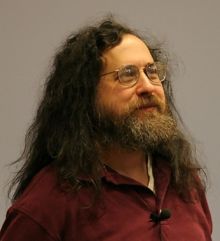The succession problem and open source

 The history of computing is the history of entrepreneurs. (Pictures from Wikipedia.)
The history of computing is the history of entrepreneurs. (Pictures from Wikipedia.)
Thomas J. Watson. Ken Olsen. Ray Noorda. Steve Jobs. Bill Gates. Michael Dell.
Each one had a unique vision for what computing should be. Each implanted that vision into a corporate culture. But all those cultures had enormous trouble after the founder passed the baton.
IBM drifted so badly in the 1970s and 1980s it became vulnerable to the "first kid with a Clue" who showed up. Gates' out-manuevering of Big Blue is still reflected on Wall Street, where Microsoft is now worth twice what IBM is.
Open source does not have any big time entrepreneurs. Its visionaries, like Linus Torvalds, Bruce Perens and Richard Stallman, sit outside the corporate culture. Open source is not designed to create kingdoms, but democracies.
So open source does not have the succession problem that bedevils the rest of tech. Michael Dell is back at the helm of Dell Computer. Gates is once more the public face of Microsoft. You can't imagine Apple without Jobs.

Does open source have this problem? If a bus ran over Linus tomorrow (god forbid), or Bruce, or Richard (left), or whomever you think is the leader of the open source movement today, how well would it carry on?
I'm guessing (no offense, Linus) pretty well. That may be the biggest advantage open source has over proprietary offerings.